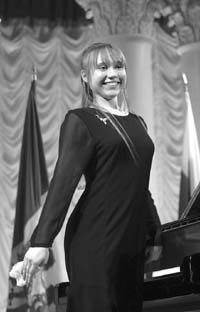Fifth Horowitz Young Pianists Contest held in Kyiv for two weeks

82 contenders from 17 countries vied in the junior (9-15 years), intermediate (14-19), and senior (16-35) groups. All performed to the accompaniment of symphony orchestras conducted by Volodymyr Kozhukhar and Mykola Diadiura. Twenty pianists from Ukraine, Australia, Belarus, China, Russia, Japan, and Yugoslavia made it to the third round. Those left behind blamed the jury, saying they were too severe or that they wanted their prot О g О s in the finals (pupils of Viktor Makarov, Valery Kozlov, and Bernd Goetzke did turn up among the winners). Many other reasons were cited except the performers’ own flaws, that any contest requires an ability to summon all of one’s resources at the right moment and show one’s best. Not all of them could do it. Even adults suffer breakdowns, so what could one expect from children? Roman Kofman, our renowned conductor and chairman of the jury, addressed those who had not made it to the finals:
“Friends, I know how you feel. For many the outcome was quite dramatic, but that’s no tragedy. Work harder on your piano. Show a more positive attitude toward the world. And learn. Listen to what your professors have to say and you will certainly reach your goals. I want the Horowitz Contest to remain an exciting event for both contestants and the audience, never to become a tragedy, let alone comedy.”
In a blitz interview with The Day, Maestro Kofman noted:
“It is generally believed that a contest is a success when it discovers at least one musician. Look at our contest. We have discovered at least three gifted pianists: Cheung Wai Ching Rachel from China, Dina Pysarenko from Ukraine, and Timur Shcherbakov from Belarus. Each was the best in their given age group. And we were especially gratified by performances in the junior and middle divisions. We awarded no gold in the senior group, for there was no apparent leader. Timur Shcherbakov was better than the rest and we placed him second. He couldn’t hold his emotions in check and show an even performance in all the rounds, although he is certainly a gifted pianist, a virtuoso, has stage presence, and I am sure that he has a great future as a professional musician.”
Roman Kofman made Shcherbakov a very expensive present, a contract with the Bonn Symphony Orchestra [Mr. Kofman is in charge there — Author]. He further stated that there were no differences among the jurors and they made a good team, returning just verdicts naming winners: Sanja Bizjak (Yugolsavia), Nogi Nariya (Japan); He Qi Zhen Zhang Haion, and Qian Cheng (China), Volodymyr Lavrynenko, Artem Liakhovych, and Oleksandr Chuhai (Ukraine); Aleksey Komarov (Russia), Lucas Opanic (Australia), and other pianists in various nominations.
Another gratifying aspect is the Kyiv contest’s increasing prestige. Every day the contenders played to full houses and there were many contestants from abroad, for the first time in five years, who turned out a serious challenge to domestic musicians — especially pianists from China and Japan, winning various awards. However, 11-year-old Cheung Wai Ching Rachel from Hong Kong became the overall favorite. This youngest contestant’s skill was highly valued by the jury awarding her the gold medal and the special prize “For the Best Performance of a Piano Concerto” — in this case Bach’s D Minor with the National Philharmonic conducted by Mykola Diadiura, met with standing applause.
The Ukrainian Dina Pysarenko also deserved her first place in the middle group. Also a virtuoso, pretty, keenly aware of the score’s nuances, and quite artistic. Before starting on Liszt-Horowitz’s Hungarian Rhapsody No. 2, she paused to look at the Vladimir Horowitz portrait hanging over the stage, as though asking his permission as a subtle interpreter of classical pieces, and then began to play, doing a tremendous job. Also, when Rachmaninoff’s Piano Concerto No. 2 in C Minor was again announced in the last round, the audience laughed, as practically every second contestant had it in his/her program, yet only Pysarenko actually managed it, playing with inspiration, showing real technique, true to the best traditions of the Slavonic piano school.
The Horowitz Contest is over, but the music continues. General Director Yury Zilberman says they will closely follow the laureates and actively help them polish their skill by consulting and pulling strings for concert tours and CD recordings. The festival, Kyiv Summer Music Soirees, will start in June and the current Horowitz winners will be among the participants to perform at UNESCO in Paris, the UN headquarters, and Moscow Conservatory of Music. The National Opera of Ukraine will commemorate Horowitz’s centennial (October 1) by staging a gala concert. Then the program will be heard by music lovers in Poland and the United States.






